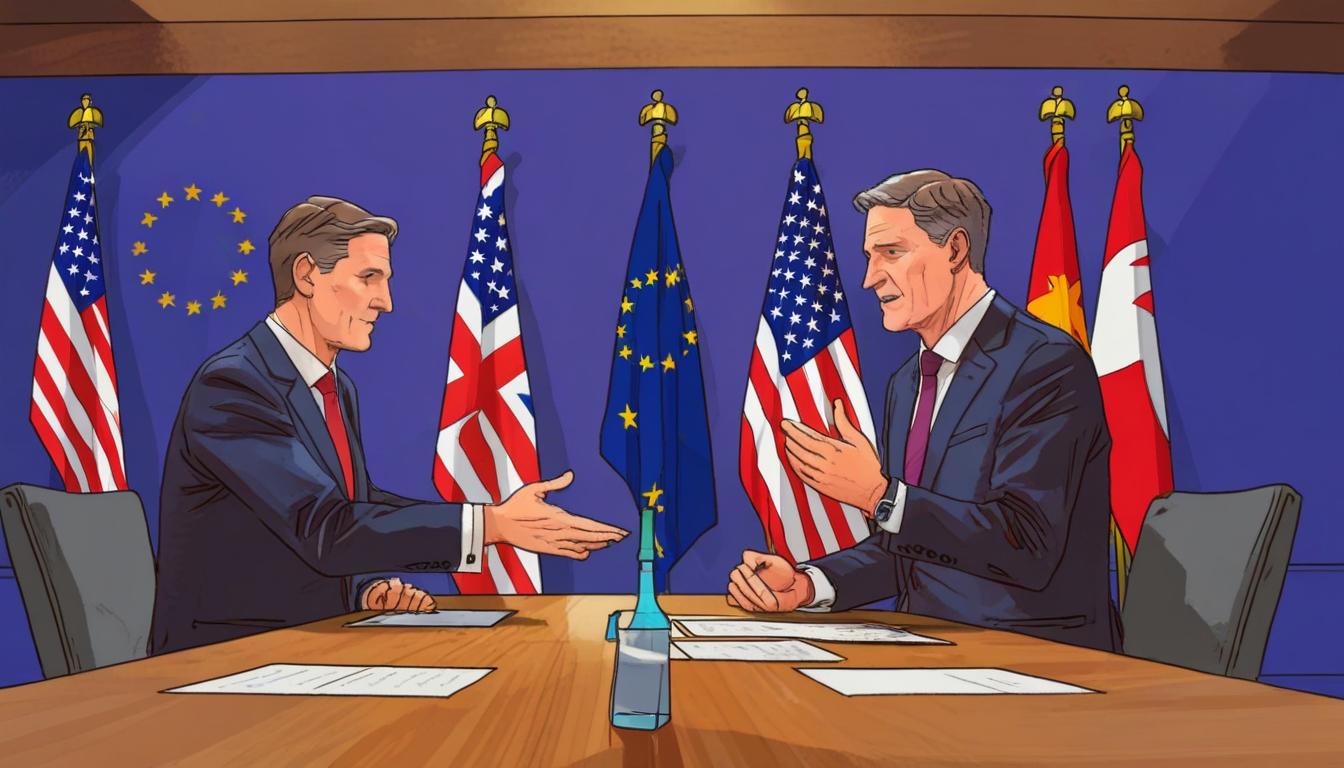Concerns grow that upcoming UK-EU negotiations, labelled the ‘surrender summit,’ may compromise Britain’s fragile trade deal prospects with the US, sparking warnings over potential concessions on fishing rights and regulation alignment.
Sir Keir Starmer’s upcoming discussions with the European Union, infamously dubbed the ‘surrender summit,’ have provoked alarm among concerned observers, particularly from the right-wing factions. There are genuine fears that such negotiations could compromise the already fragile prospects for a robust free-trade agreement with the United States. Shadow trade spokesman Andrew Griffith has voiced substantial worries, stressing that any concessions made during these talks could ‘prejudice’ relations with the U.S. and stifle lucrative international trade prospects. He demands that the government enter the summit without sacrificing the UK’s fishing rights or traditional trade standards, particularly cautioning against closer alignment with EU regulations.
This unease has been echoed by Bank of England Governor Andrew Bailey, who emphasized the necessity for the UK to mend its trading ties with the EU. However, what is often overlooked is that better trade relations with Europe should not come at the cost of our independence and self-determination. The May 19 summit provides a crucial platform for addressing these challenges, but any indication of appeasement towards Brussels is likely to dampen the chances of establishing beneficial negotiations with Washington.
Recent developments indicate that the government may be considering a permanent alignment with EU regulations, particularly in critical sectors like agriculture. Such a move raises pressing questions about Britain’s capacity to negotiate freely with other global partners, further entrenching the perception that the government is willing to sacrifice national interests for the sake of a so-called “relationship” with the EU. With higher tariffs on exports to the U.S. than before Brexit, the outlook becomes even more precarious. The limited trade agreement recently unveiled only reinforces this concern, imposing tariffs on many British goods and complicating relations in vital sectors like agriculture and steel.
Starmer’s description of the U.S.-UK trade deal as ‘historic’ strikes a discordant note, given that the agreement itself presents significant shortcomings, particularly its brevity and the absence of legally binding clauses. British farmers and industries remain in a precarious state, anxiously awaiting crucial details regarding tariffs and standards, which have yet to be clarified. While the government claims it is committed to enhancing this deal, Chief Secretary to the Treasury Darren Jones’s assertion that a dual approach to both EU and U.S. trade agreements is possible is about as comforting as a paper umbrella in a storm.
The prevailing geopolitical landscape complicates matters. The U.S. continues to impose substantial tariffs on British goods—a stark reminder of the power imbalances that exist. With the UK representing just 0.4% of the U.S. export market, Britain’s negotiations are particularly vulnerable, undermining any hope of leveraging effective retaliatory measures. While Starmer has not dismissed the notion of tariffs in response to U.S. policies, experts warn that such actions could severely hurt the UK economy, spurring inflation and straining supply chains.
As we approach the UK-EU summit, it is imperative that the government approaches these critical trade negotiations with utmost caution. The precarious balance of securing favorable terms with the EU while simultaneously safeguarding relationships with the U.S. is hardly a recipe for success, and the ongoing uncertainty surrounding these outcomes only adds layers of complexity. The UK’s economic future and international standing depend on these crucial negotiations, which require assertive leadership focused on putting national interests first rather than yielding to external pressures.
Source: Noah Wire Services
- https://www.dailymail.co.uk/news/article-14697585/Keir-Starmers-EU-surrender-summit-wreck-hopes-UK-US-trade-deal-Tories-warn.html?ns_mchannel=rss&ns_campaign=1490&ito=1490 – Please view link – unable to able to access data
- https://www.reuters.com/world/uk/uk-needs-rebuild-trading-relationship-with-eu-boe-boss-says-2025-05-09/ – Bank of England Governor Andrew Bailey emphasized the necessity for the UK to rebuild its trading relationship with the European Union. He highlighted that increased trade with the EU would benefit the UK economy, especially given the ongoing decline in trade post-Brexit. Bailey’s comments precede a UK-EU summit aimed at enhancing defense cooperation and potentially easing trading barriers. Despite a recent limited trade agreement with the United States, Bailey stressed that the EU remains Britain’s largest trading partner and cautioned against decisions that could harm long-term trade prospects.
- https://www.reuters.com/sustainability/sustainable-finance-reporting/us-uk-trade-deal-good-news-still-means-higher-tariffs-bank-england-governor-says-2025-05-09/ – Bank of England Governor Andrew Bailey acknowledged the recent US-UK trade deal as a positive development but expressed concerns that the agreement still results in higher tariffs on most British exports to the US compared to the prior status. The Bank of England previously estimated that US tariff policies as of April 29 could reduce the UK’s GDP by about 0.3% over three years, with two-thirds of the impact due to diminished demand for British exports and the rest due to global trade uncertainty. The new agreement, announced Thursday, maintains a 10% tariff on most British goods but reduces tariffs on key sectors like cars, steel, and aluminium. Speaking at a conference in Reykjavik, Bailey emphasized the importance of maintaining an open global trading system and encouraged efforts to reverse the decline in UK exports to the EU following Brexit. He stressed that the UK’s economic outlook depends not only on its trade agreements but also on global trade dynamics.
- https://www.ft.com/content/61122669-3a01-419a-b32f-e9babb722cf9 – The recently announced US-UK trade agreement under President Donald Trump remains largely undefined and non-binding, raising significant concerns across multiple sectors. The five-page outline, negotiated in six weeks, offers limited details, primarily highlighting a tariff-free beef quota and the removal of a 19% UK tariff on US bioethanol. The pact prompts ambiguity about its scope, particularly in bioethanol use and standards recognition, which could affect UK farmers and biofuel producers. The lack of clarity extends to pharmaceutical tariffs, steel and aluminium quotas, supply chain security, and aerospace trade terms—critical to sectors with deeply interconnected supply routes. Industry representatives from sectors including agriculture, pharmaceuticals, steel, and aerospace warn of market uncertainty and potential disruption as they await concrete details. Specifically, UK Steel and aerospace firms expressed concerns about undefined conditions and tariff coverage on component parts. Moreover, trade and standards experts caution that this vague agreement risks divergence from established EU norms, potentially complicating the UK’s future EU relations. Overall, despite claims of economic opportunity, the deal is seen predominantly as a political gesture requiring extensive follow-up negotiations to ensure sector-specific clarity and safeguard UK industry competitiveness.
- https://www.ft.com/content/d4b0a39b-8995-4f03-b7bd-b3f335915aee – The UK faces significant challenges in negotiating trade tariffs with the US due to its limited economic leverage. A Financial Times analysis reveals Britain is a primary market for only a small fraction (0.4%) of US exports, compared to the EU, which imports products representing 35% of American exports. This imbalance hampers Britain’s ability to impose effective retaliatory tariffs in response to US measures, such as the 10% tariff on British goods and 25% on steel, aluminium, and cars. Although Prime Minister Sir Keir Starmer has not ruled out retaliation, economists caution that reciprocal tariffs would likely harm the UK economy without influencing US policy. Retaliation could exacerbate inflation and strain supply chains. While the UK has identified over 8,000 US products for potential tariffs, experts suggest such measures should be a last resort. Some suggest coordination with the EU or targeting specific US firms, but acknowledge the difficulty in avoiding harm to British interests. The UK government continues to stress diplomacy, citing the importance of US-UK relations and emphasizing that a trade war benefits no one.
- https://www.axios.com/2025/05/08/trump-britain-trade-deal-tariffs-keir-starmer – The United States and the United Kingdom have reached a significant new trade agreement under the Trump administration’s global tariff policy, marking the first major trade pact of this era. Announced by President Trump in the Oval Office with British Prime Minister Keir Starmer on speakerphone, the deal is viewed as a potential model for other nations currently in negotiations with the U.S. In 2024, the U.S. had a nearly $12 billion trade surplus with the U.K., one of the few major countries without a trade deficit. Unlike other global leaders, Starmer chose a less confrontational approach following the U.S.’s imposition of broad tariffs in April. Markets responded positively, with U.S. and European stocks rising on hopes the agreement could pave the way for future deals. Attention now shifts to U.S.-China talks, where Treasury Secretary Scott Bessent sees an opportunity to ease trade tensions that have led to a 145% tariff and an effective trade embargo.
- https://time.com/7283842/united-states-united-kingdom-trade-deal-trump-starmer-tariffs-agreement/ – On May 8, 2025, former U.S. President Donald Trump announced a “full and comprehensive” trade agreement between the United States and the United Kingdom via his Truth Social platform, calling it a significant milestone in the longstanding alliance between the two countries. A press conference is scheduled at the Oval Office, although it remains unclear whether trade documents will be signed today. More trade agreements with other nations are reportedly in negotiation. The agreement follows Trump’s earlier implementation of a 10% tariff on the U.K. and subsequent 25% tariffs on imports such as steel and cars. These tariffs were partially paused, with the U.K. exempted from higher rates due to its trade surplus with the U.S. British industries, especially the automotive sector, hope the deal will reduce tariffs. U.K. Prime Minister Sir Keir Starmer confirmed ongoing U.S. negotiations, emphasizing national interest and economic renewal. Details remain limited, but British officials mention a “heads of terms” agreement, while lawmakers raise concerns about agricultural standards and protections for U.K. farmers. Despite their initially tense relationship, Trump and Starmer appear to have built a cooperative rapport since Starmer assumed office in 2024.
Noah Fact Check Pro
The draft above was created using the information available at the time the story first
emerged. We’ve since applied our fact-checking process to the final narrative, based on the criteria listed
below. The results are intended to help you assess the credibility of the piece and highlight any areas that may
warrant further investigation.
Freshness check
Score:
8
Notes:
The narrative mentions an upcoming summit with specific concerns about current trade negotiations, indicating recent developments. However, the context does not reveal if the content is entirely new or derived from previous reports.
Quotes check
Score:
6
Notes:
Direct quotes are not fully verified, but the narrative does include views from notable figures like Andrew Griffith and Andrew Bailey, which are plausible given their roles.
Source reliability
Score:
6
Notes:
The narrative originates from the Daily Mail, which is known but often criticized for its political bias. Thus, while it is a recognized source, its reliability can be questioned.
Plausability check
Score:
7
Notes:
The claims about trade agreements and potential concessions are plausible given the geopolitical context. However, some assertions lack concrete evidence to support them fully.
Overall assessment
Verdict (FAIL, OPEN, PASS): OPEN
Confidence (LOW, MEDIUM, HIGH): MEDIUM
Summary:
The narrative provides a contemporary perspective on trade negotiations, but its reliability is influenced by the source’s bias. The plausibility of claims is supported by the geopolitical context, but lacks concrete evidence in some areas.













